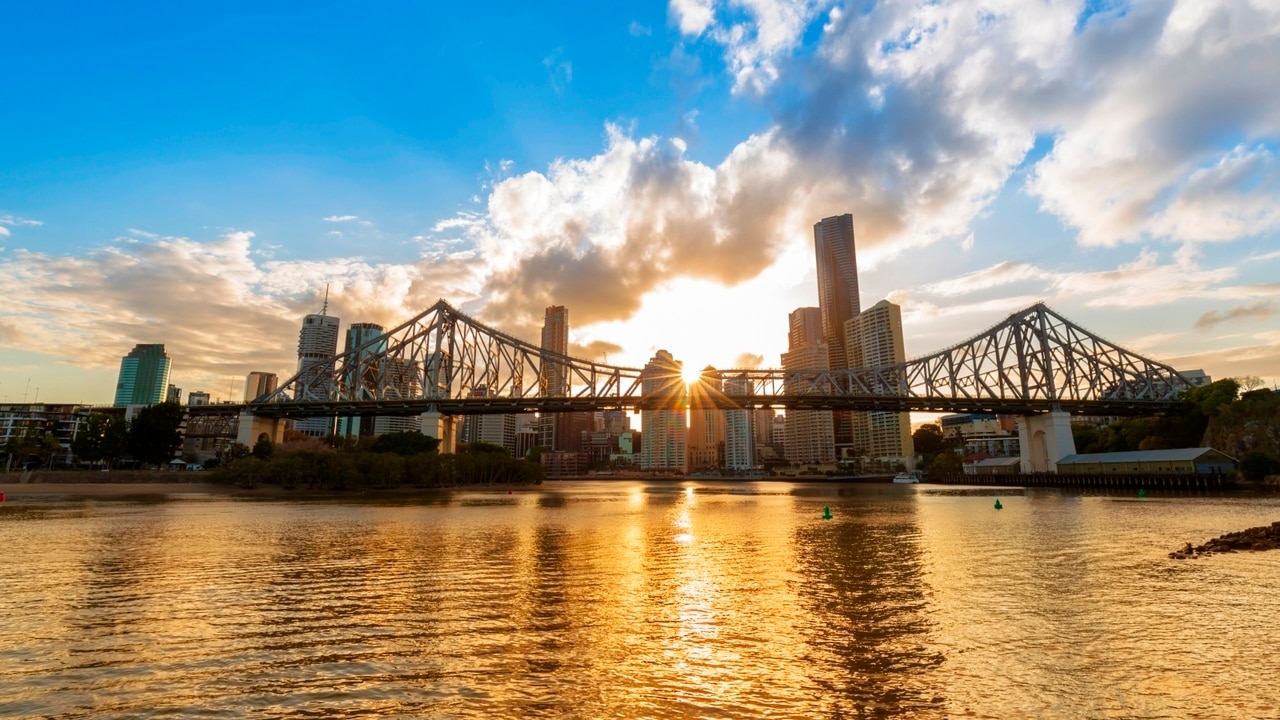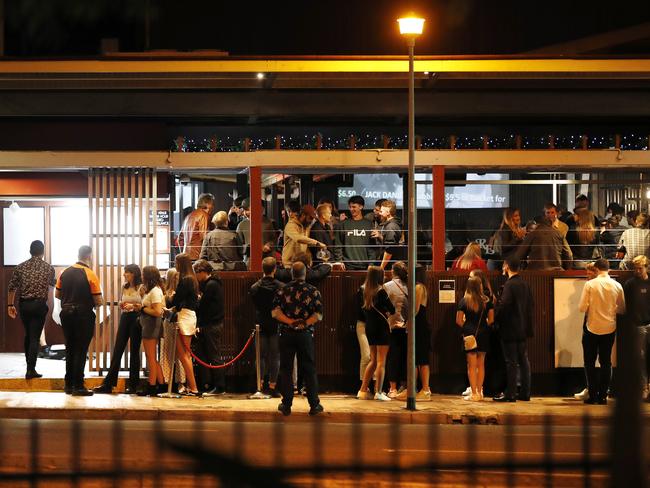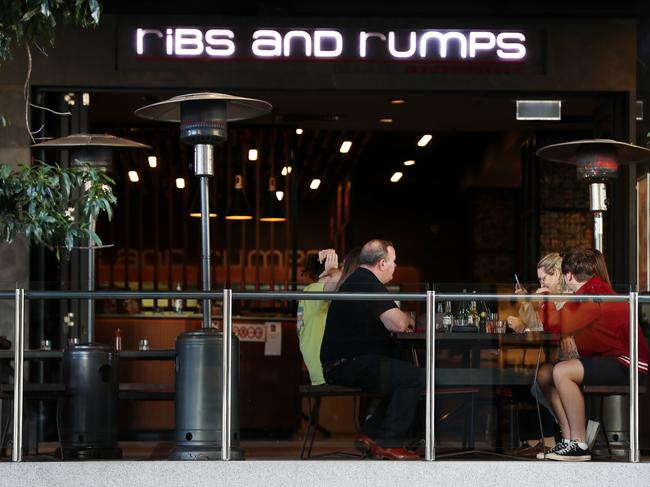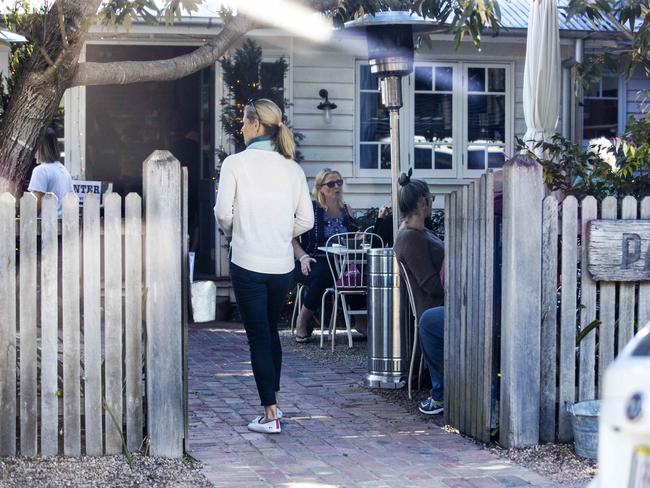Brisbane cafes, restaurants failing to meet COVID-19 requirements
Queensland’s status as a coronavirus safe haven is at risk, with shocking revelations of restrictions not being enforced by councils or venues. FIND OUT WHAT EATERIES AREN’T FOLLOWING THE RULES

QLD Coronavirus News
Don't miss out on the headlines from QLD Coronavirus News. Followed categories will be added to My News.
A WORRYING gap has been exposed in the way COVID-19 laws for venues are being followed and enforced.
Queensland local councils are refusing to issue fines, and an investigation has found over a quarter of eateries are failing to take diners’ contact details.
Police fine 10 people for lying on border declarations
Coronavirus: US stunned by Australia’s virus surge, as parliament canned
Office of Liquor and Gaming Regulation to stop giving venues breaching restrictions warnings
The alarming situation has forced Chief Health Officer Jeannette Young to write to the peak bodies for restaurants, cafes, pubs and clubs to stress how vital the information is for contact tracing during the pandemic, which can be the difference between a hard or soft lockdown.
Victoria recorded 428 new cases on Friday in a devastating second wave that began with a breakdown in quarantine processes meant to protect the community.
NSW is dealing with community transmission of the virus from a pub that allegedly failed to take contact details.
But even as Queensland desperately tries to avoid a similar fate, it can be revealed local councils – which are in charge of restaurant and cafe checks – are choosing not to fine venues that fail to comply with COVID-19 laws and in some cases are doing very few inspections.
Brisbane City Council – the largest local government organisation in Australia – said only 159 venues had been inspected since May 15 and none were fined as it preferred to take an educational approach.

When asked why the numbers were so low, a spokeswoman said that council had only been asked by the State Government to “act reactively, which is what we have done”.
Gold Coast City Council inspected more than 2600 venues including cafes, restaurants and beauty salons since early April, but has not issued fines as it also takes an educational approach.
Other councils including Sunshine Coast, Cairns and Townsville could not provide details of their inspections or enforcements.
Police and the Office of Liquor and Gaming Regulation patrol pubs and clubs for compliance and have so far carried out more than 9000 inspections, with nine fines issued.
Each infringement for failing to comply with the chief health officer’s directions was for $6670 as business operators have been corporations.
Eighteen of 68 eateries visited by The Courier-Mail across southeast Queensland were found not to be adequately enforcing rules that require patrons to give their name, address and phone number so they can be traced in the event of an outbreak.
A Queensland Health investigation, ordered by Dr Young, found almost identical results, with about a quarter not complying.

She has now expressed alarm at eateries becoming complacent with contact details in particular, with the situation becoming so worrying that she penned a letter to the industry’s peak bodies urging compliance.
“I would like to stress the importance of businesses keeping contact information of all guests and staff for the purpose of contact tracing,” she wrote.
“Unfortunately, it has come to my attention that some businesses have become complacent in collecting this mandatory information.
“There is an expectation that this information will be readily available to contact tracing officers when required.”
When told of the COVID-Safe Plan lapses found by The Courier-Mail, Dr Young said: “This is disappointing.
“If a case arises from a venue, we need all the information we can get to track who else has been exposed and take appropriate action.
“Contact tracing is one of the most crucial tools we have in controlling disease outbreaks.
“Compliance can mean the difference between hard lockdown and soft lockdown.

“If we have information and confidence about who has been in a venue we’ve got more options regarding lockdown measures.”
Griffith University Infectious Diseases and Immunology professor Nigel McMillan said every business should be asking dine-in patrons for their contact details.
“From an infectious disease control point of view, it’s a positive as contact tracing is really time consuming and this would make it much more effective,” he said.
“It just means contact tracing is slower and, as we can see from NSW and Victoria, time is really critical in shutting down the spread – those two states look at us with envy currently and we want to keep it that way.”
Queensland Restaurant and Catering Association chief executive Wes Lambert said it was not a matter of whether businesses agreed with the regulations, but the register was to protect the state from the devastating economic effects that could come with another outbreak.
“It is imperative that they do so,” he said.
“With the federal and state government suppression strategy, contact tracing is the best way to ensure there are no strict lockdowns or tightening of restrictions when an inevitable outbreak occurs.”
Rules not followed or vague
Restaurants are inconsistent in enforcing customer compliance with COVID-19 contact registers.
Of 68 restaurants visited by The Courier-Mail, 18 did not ensure customers gave contact details by either not providing a sheet to sign or checking QR codes had been scanned.
While most eateries strictly enforced sign-in rules, it is understood some are under the mistaken belief they only needed contact details from one party member.
Owner of SK Steak & Oyster, Simon Gloftis, said QR codes and physical registers were used at all his businesses, with details collected “over the phone” with a reservation.
Tom Sharpe said his cafe Sippy Tom kept a register at the counter and “everyone who orders dine-in has to fill it out”.
Lolo Beck said her business Baked Poetry also kept a stringent paper register.
A Yolk Newstead spokesperson said: “We have the appropriate details on the wall and anyone who dines in is asked to fill out the paperwork.”
Little Red Dumplings Springwood owner Leo Yin said the venue had a register and customers were asked to sign before they came in, or before they paid. Marinara Trattoria co-owner Umut Ladini said it was following all regulations, with waiters taking sign-in sheets to each table.
Cafe 63 owner Hamish Watson said its policy was for all Cafe 63 outlets to adhere to COVID-19 guidelines and for all customers to sign in.
Ribs and Rumps at Milton said they had individual COVID registry forms on every table for guests to sign.
Paddock Bakery owner Maya Scholz said the cafe had a COVID-safe plan in place, including QR codes for customers to sign in or a printed version. Petrichor & Co had QR codes on its tables, and Pasture & Co owner Dani Riley said the business complied with COVID-safe regulations.
What venues need to do
■ Pre-bookings and walk-ins must provide name, email address and phone number. This information must be kept for a minimum of 56 days.
■ No contact details needed for takeaways
■ There must be 4sq m for each patron (2sq m for smaller venues)
■ When possible people should remain 1.5m away from others, except if in the same group
Venues observed by The Courier-Mail not to be enforcing sign-in
■ Ribs and Rumps (Milton)
■ SK Steak and Oyster (New Farm)
■ Bowen Arrow (Bowen Hills)
■ Baked Poetry Cafe (Peregian)
■ Cafe 63 Bulimba
■ Little Red Dumpling (Springwood)
■ Paddock Bakery (Burleigh Heads)
■ Social Brew (Burleigh Heads)
■ The Journal Cafe (Mermaid Beach)
■ Windernis (Palm Beach)
■ Pasture & Co Cafe (Currumbin)
■ Petrichor & Co (Ascot)
■ Yolk (Newstead)
■ Piggyback Cafe (Jindalee)
■ Thai Terrace (Paddington)
■ Marinara (Paddington)
■ Kaisen Japanese Restaurant (Paddington)
■ Sippy Tom (Teneriffe)
